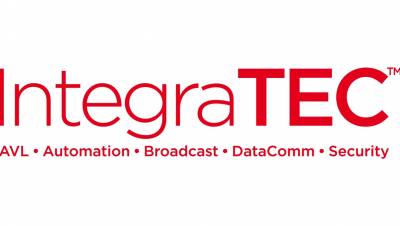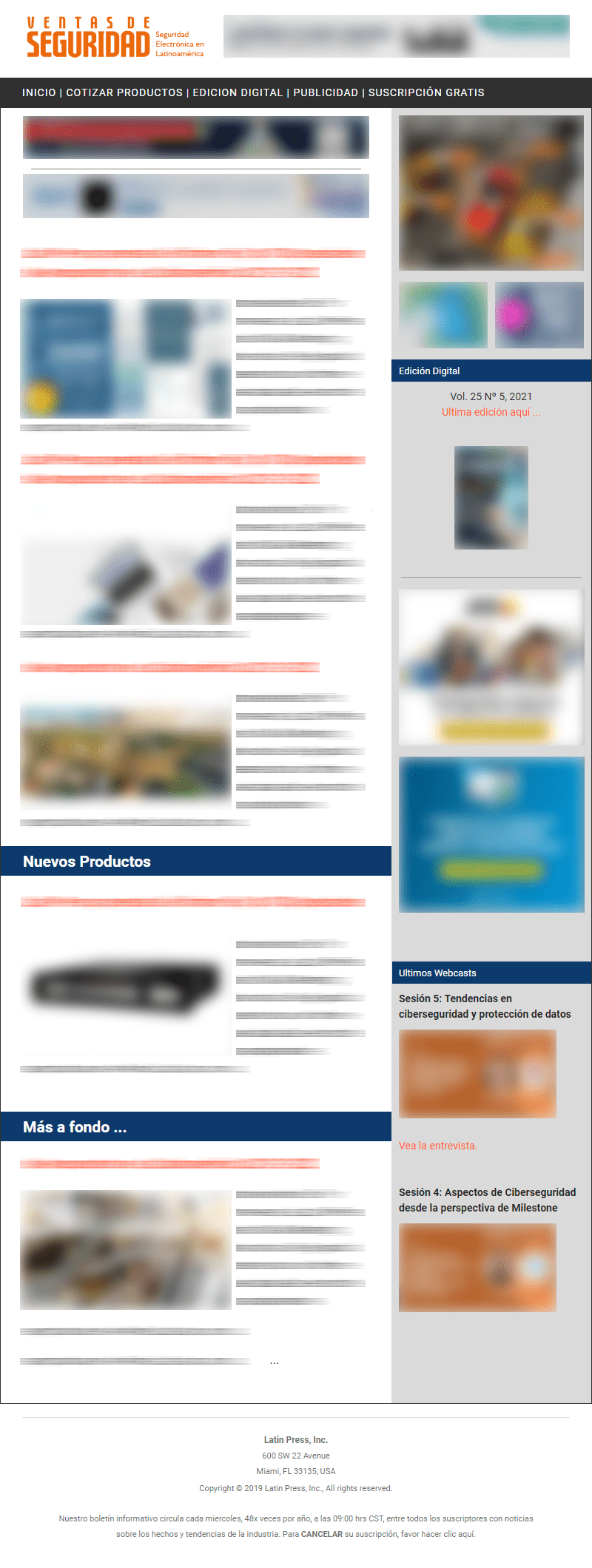by Julián Arcila
During the three days that the show lasted, the term IP was present both in the educational sessions and in the stalls of the companies that exhibited. The whole market sells IP today and to tell the truth this has changed the industry; even an expert suggested that the term CCTV could soon be eradicated from the jargon of security, because to the extent that video applications run more frequently on structured cabling networks it does not make sense to talk about closed circuits, since when rolling on IP the system becomes open.
In this order of ideas, the term that will perhaps be coined more and more frequently, will be that of IPVSS (video surveillance systems over IP, for its acronym in English) or perhaps a more generic one, that of IPVS (video over IP systems).
About 26,000 security professionals were at the center of the technological hurricane during the three days. There were a lot of educational sessions and, in truth, those who participated in this show were able to know the main industrial trends for this new year.
Varied and ambitious trends
An example of ip being in everything is the company Brivo. They are recognized for developing card-based access control systems that operate on this mode of transmission (their equipment can be monitored from any computer). Shawn Gore, director of distribution and international sales of this firm, confirmed the trend and explained that traditional security installers and integrators are increasingly moving to the IP-based segment. "For the last five years most of the cameras you saw on the market were analogous; for the next three years most will be of the IP type. Even in access control, analog systems still have a broad base of operation, but one reality is that both manufacturers and installers are trying to migrate," he said.
Fernando Tomasiello, vice president of international sales of GVI Samsung, also spoke of the transition that is being observed at the moment. He went further by stating that currently 80% of large projects are changing from analogue to IP.
Paul Bodell, CMO (president of marketing) of IQinvision (a company dedicated to the development of mega pixel cameras) confirmed the previous trend and pointed out that it is increasingly common to see such a transition regardless of the segment in which they are. "Within our segment, the big trend is to see people who are taking real advantage of these types of cameras (...) in the conventional world of CCTV users had many limitations in the sense that they only had two formats to choose from: NTSC or Pal. Now, in the new field of video over IP systems, users can choose cameras in a wide range of capacities in mega pixels; in this way, consumers are more aware now than ever about the fact that you have a higher quality, but also about the decrease in the costs of technology," he said.
As always, the questions are structured around the networks needed to operate these systems. Bodell, however, adds to the debate by arguing that not all IPVS systems should be structured for remote observation. According to this professional, many of the IP video surveillance systems that are installed today run on a LAN and in this way there is no need to worry about the available bandwidth.
But we must also raise questions related to Latin America's ability to enter this new trend. It is important to note that according to the Global Information Technology Report, presented in early April by the World Economic Forum, the most connected nation in Latin America is Chile and ranks 34th out of 127 nations evaluated. This nation in turn is 24 places above its follower, Mexico, a country that ranks 58th among the most connected nations on the planet.
On this topic SECURITY SALES consulted the experts, taking into account that in addition to the migration to IP there is another trend that stands out and is the greater link between electronic security and computer security.
The opinions are quite positivist, in the sense that professionals believe that Latin America will develop as time goes by. León Chlimper is going in this direction and believes that this region will end up adopting the North American advances in terms of convergence, since it has done so with everything related to technology, but he noted that the march will be slow. "The adoption of technology that facilitates convergence between security and IT is going to be slow in this region. For example, biometrics; it is something that still needs more development either because of the costs or because of the stigma that can be had to be scanned on your fingerprints by a reader. In other words, there is resilience and biometrics is certainly the key to a successful integration between the worlds of physical security and information technologies," he noted.
For GE Security, Latin America is perhaps a key region, because in the opinion of Mark Barry, president of this division for the Americas, security will grow in those regions where the economy grows (something that has been presented in Latin America, in addition to other emerging regions); In these markets, he said, the word security will become an important aspect, because every day there is greater awareness of the importance of protection and the issue of computing will not be far from this trend.
GVI's Tomasiello, for his part, believes that important steps have already been taken towards the adoption of the IP methodology as a standard for the transmission of electronic security signals. As proof of this, he highlighted the figure he gave previously in relation to the use of this standard. "I can affirm that today the big projects that come out for IP line, with servers running entirely on the networks of the companies, are done more often in Latin America than within the United States. I think Latin America has taken important steps in preparing for this trend."
Everyone is educating
As the writer has exposed in multiple scenarios, education is truly the most effective marketing strategy today. However, talking about education is not always easy for all companies, even more so for those that do not have a well-defined or established base in certain regions; Given the above, firms that want to enter this market must look for several possibilities such as participation in fairs and entry into an increasingly used scenario: webinars.
Artnix (Korea, CCTV) is one of these new companies that seeks to enter the Latin market with force. Its director, Anthony Hong, explained that its positioning strategy for this year is based on participation in several recognized scenarios in Latin America. "We plan to attend at least the two most important security events in the region, such as Exposeguridad and the Brazilian security show, with the aim of establishing channels and then proceeding to a training program, because something that is clear is that if a customer does not know your products they will not use them," Said.
But another fundamental element emerges to achieve this penetration in the market: customer service. Kevin Shahbazi, CEO of Avocado Security (Software application that adapts to CCTV systems to convert images into important information for corporate decision making), said that he has a great interest in approaching a market as interesting as Latin America and said that within his strategies to reach that territory is the participation in news media, something that has served them a lot in the United States, but also work the development of the distribution channel, to develop with their representatives in the different countries a joint training program.
Regarding this issue, Tomasiello said that they are working in several directions; initially commented that they are carrying out a series of road shows whose fundamental purpose is to provide training for end users, integrators / installers and distributors. "What we have invested and we are going to invest in education is very important (...) we are also attacking universities very strongly to start creating courses for people to be trained from the first years. In Latin America we are already teaching within universities," he noted.
U.S. recession, good or bad?
Much has been said in the last year about the facts that have been presented within the U.S. economy. In addition to the decline in job creation forecasts and low consumption in key periods, the depreciation of the American currency, as well as rising inflation, make many people already speak of recession in the land of Uncle Sam.
What impact could this situation have for the security industry? Technically you could talk about a couple of situations that could arise. In the first place, it is feasible that the investments of American companies in the region enter a stage of freezing and in this case the creation of new offices in Latin countries can be included, since the appreciation of local currencies against the dollar makes operations more expensive.
However, this situation has a positive part and that is that because of this appreciation, Latin distribution companies can buy technology at lower prices. However, it is important that experts and business managers give their opinion on this. The truth is that there are more who are comfortable with the current economic environment than those who feel somehow worried.
For Brivo's Shawn Gore, the dollar's depreciation is a tremendous benefit for both American and Latino companies. "With a strong dollar it has always been harder for U.S. companies to sell technology in Latin America. With the current situation prices are much lower than they have always been and this is favoring exports," he said.
Paul Bodell was particularly pleased with such a situation and said that "the weakness of the dollar has helped them quite a bit outside the United States. The dollar has been well below the euro; anywhere this occurs makes our products much more accessible. On the economy I can say that we have been observing its performance and taking the appropriate measures to prepare in case the period of low economic dynamism is prolonged."
News events during the show
This edition of ISC West brought with it several news events that somehow provide the possibility of interpreting the variations that the industry could have during 2008.
The beginning of the fair was given with the announcement of the firms HID and Lenel to start a collaborative project by which the Edge™ family of IP-based access control solutions, from HID, will be incorporated into the OnGuard 2008 Plus solution of Lenel. According to a press release issued by both companies, "Edge's support will allow Lenel to continue to expand OnGuard's capabilities to bolster existing systems, offer complete deployments of contactless smart cards, and meet the needs of users seeking IP-based devices as part of or as the entire hardware platform of their access control system. The collaboration of these two technology leaders creates a robust yet flexible solution for access control and security."
On the sides of GE there were also quite a few novelties. In addition to the hiring of three new employees to consolidate its strategic team (a group within which Barry is located) and the award received as the Company of the Year in the Video Surveillance Solutions segment, granted by Frost & Sullivan, the firm announced the acquisition of some assets of the company CoVi Technologies (provider of IP video systems based in Austin, Texas), a measure with which it intends to expand its portfolio of video surveillance solutions. According to a statement delivered by the firm at its press conference, the assets acquired include video system technology as well as intellectual property.
GVI also introduced new news. The launch of this company's IP line stands out. Steven Walin, president of the company, said "we are pleased to present our new IP line at ISC West (...) products like these, top-notch, put us at the forefront of that key moment in the industry in which we are witnessing the transition from analog to based systems. in networks". Additionally, the alliance between this firm and the software provider for IP video systems Verint Systems stands out (see news section of this edition).
Overall, the 2008 section of this renowned show had a lot of interesting elements. Perhaps the most positive thing is that many more companies are paying attention and showing interest in Latin America, something that differs from what was seen years ago when this territory was seen as a second-rate space. technologically speaking. The most contradictory thing, however, is that for several years Latin America has enjoyed security applications with the same level of sophistication that is observed in the United States, Europe and Asia.
























Leave your comment